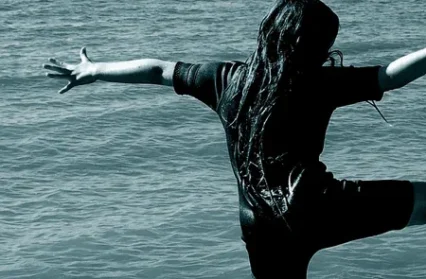To celebrate its brand-new location in the Xanadu Meadowlands, all patrons the week of December 20th can buy one meal, get one free.
Sam posted these words to the blog he’d started: New Jersey on the Cheap. With his two passions –mall food courts and Internet discounts– so intertwined, you can see why he, like many of us, is soft and getting softer.
At the old Kubla Khan’s in Paramus, Abyssinia told him not to mash the frozen strips of beef and lamb with his fingers. So what if it was against house rules and the Code of Health? Otherwise, Sam knew, everything cooks down to nothing. The opposite of alchemy: water plus heat plus fat plus time.
How, Sam, did you fill your bowl before Abyssinia changed you? You used to love the icy leaves of marbled-flesh, the ladlefuls of oil and peppersauce. Never watercress, or vegetables sliced julienne. You handed it to the man on the toroidal grill and tipped him to cook yours first. You wanted rice buns, Sam, egg drop soup not hot and sour. One large fountain drink –no ice– with all the flavors mixed together. From left to right: orange soda, lemon-lime, cola, diet cola, root beer, raspberry tea. The foam turned green. As kids you called it a suicide to scare the meek ones. You were a meek one.
Tonight though, for Abyssinia, Sam will drink only water, and season his bowl with nothing but rice wine vinegar. And from the other side of the sneeze-guard, the different meats will glisten, like fish scales red or green, depending on how the light hits them.
For years, Sam has interred himself ever deeper in technophilia, that shallow and linked system of caves. He has sought his daily bread in online maps, his women in online databases, and spent his days as one proxy to many servers. Soon he will go from being a young man in old man’s clothes to an old man in young man’s clothes. But right now he is in between, waiting for time to cross him: a no man in no man’s clothes.
He has picked this brand-new Kubla Khan’s to propose to her, Abyssinia, his girlfriend of several years, and everything needs to be perfect, like the beginning of a fever-dream or a vision in a fragment. Don’t worry, we are here for Sam and will not betray him.
Together, we enter the Xanadu Meadowlands, the largest mall in America. Sam is not slow or careless, but a Romantic. He has chosen food court Mongolian because he values the element of surprise and privileges it over awe. If he didn’t, he might have rented a hot-air balloon, and, with the New York skyline for a backdrop, kneeled to Abyssinia in false submission, bending her will to his over flutes of champagne and berries dipped in chocolate.
We are all for hot-air balloons. They enthrall us. But in East Rutherford, New Jersey, there are no savage places, sacred rivers, or calm winds for lovers to ballast their love.
Xanadu –let’s get rid of the Meadowlands– towers five stories tall, runs five million feet square, and is built on ground so fertile they call the land filled. It has five zones, though today we will visit just one.
The five: Sports (Snowdome), Entertainment (Funplex), Youth Culture (Wannado City), Fashion (To Be Determined), and Food & Home, the vault from which this story hangs. Xanadu is America’s right hand, with five giant fingers designed to manipulate objects and subjects with equal dexterity. But we are in danger of losing Sam. Where is he?
Sam parks Abyssinia’s hatchback in one of the eight thousand smart spaces. The couple crosses the threshold into Kubla Khan’s, where at the register we join them. Once their bowls are laden, it is time for the raw to become cooked.
-Welcome to Kubla Khan’s. Credit or debit?
The girl at the counter is slight and dressed in flowing black robes, like a cat burglar might wear, sitting at home on a Sunday morning. How tied we are to place.
-Credit please, Sam says, lost in thought, as if wondering what happens to underage gymnasts when they become overage. How tied we are to time.
-Can I see an ID? Thank you. Isn’t it funny, the girl says, looking up at Sam, we have the same birthday, you and me.
Abyssinia opens her eyes wide. She enters the scene with her eyes.
-Do you say that to everyone? Abyssinia asks the girl. Do you think it will fill up your tip jar faster?
Abyssinia stares through her. The girl pretends not to understand. Does it shock us, such unprovoked and naked ire? As far as we can tell, Abyssinia is just being loyal to Sam, and sees his honor at stake. That’s how it is for Abyssinia. After years in social work she runs on turmoil, and, though it might seem crude as desire or the world’s first factory, she creates it where it can’t be found. And so the two women hold their antipathy like a stone between them. Seconds pass before the charge comes through, and Abyssinia signs the bottom of Sam’s receipt.
And what of Sam? Sam –no eyes on him but ours– has taken advantage of what a single moment may yield. He has pulled a special fortune cookie from his pocket, and dropped it in the bowl with the others. And now he takes that fortune cookie out of the bowl, handing it to Abyssinia, random-like, as if the sweetest fruit could be plucked from the lowest, meanest bush. She fails, in the wake of her conniption, to notice that her cookie is the color of honey, while the rest are bleached-flour.
-Here you go, dear, he says. Just don’t open it until after the meal.
Not used to subterfuge, Sam looks for some thing to busy his hands, some thing solid and within reach. He grabs a catering brochure and the metal stand with their number on it: twenty-five.
Like many couples, Sam and Abyssinia create tasks to divide their labor, as if the point of fusion were fission. He splits off to find their table. She goes to fill their beverages, two lemon slices per seltzer water, crisp and sugarless, the opposite of a suicide.
When Abyssinia returns with their drinks, Sam is reading about catering, not caravanserais, and she asks him a question.
-Was he the one with the elephants?
-Who?
-Kubla Khan.
-I don’t think it’s that kind of brochure.
Sam pauses, believing to a fault, like some pedant-lover or furloughed sailor, that unless he tacks perfectly to the winds of Abyssinia’s caprice, his marriage proposal will fail.
-Well, Sam says, you’re probably right. If Kubla Khan was an emperor, he must have had at least one elephant.
Such blind praise never suited Sam, and he is hungry and impatient to propose. But the days of rice buns and egg drop soup are long past, and the two fortune cookies remain the only edible thing at their table. That is, until the time –it can’t be long now– when their number is called.
-I guess you’re right, Abyssinia says, embarrassed for having fought with the counter girl. About elephants, Sam, did you know they only die from one thing, besides poachers and lions?
Perhaps Abyssinia offers up this trivia in appeal to Sam’s good nature, as a windblown scrap to revive something lost between them.
-Why don’t we change the subject? Sam says. Our meal’s almost ready.
It is all out of our hands now. We can no longer tell if the proposal still looms, or if Sam was ever going to do it to begin with.
-Please?
-Okay. What do they die of?
-Starvation, Abyssinia says. First they grind one set of molars down. Then another. And that’s it. They only get two. Otherwise, they’d live forever.
You know, Aby, I would never let that happen to you. I’d feed you mush with my trunk. You’d do the same for me, wouldn’t you?
Sam isn’t testing her, not really. From his lips, a drop of spit falls onto the brochure in anticipation. Do not cringe; we all have glands, desires.
-Honestly, Abyssinia says, I’m sorry I brought it up. I’ll go check on our food. She rises to her feet, as if by leaving and coming back she might reshape the midden heap of their dinner into something more sublime.
Over to the grill she marches. Hoping to avoid the counter girl, Abyssinia turns to the restaurant’s front door, and catches sight of a man with flashing eyes and floating red hair. He does not belong in Kubla Khan’s. Anyone could tell that. The man’s clothes are grimy. He holds three plastic bags in each of his hands, and on his feet his foam sandals are full of holes. We describe his habits because he is unknown to us; we did not see him coming. Who expects such things in Xanadu? This red-haired man so captures Abyssinia’s attention that she very nearly knocks a young girl to the ground.
And Sam? Sam still sits tableside, tracing the far-off waves of heat with his finger. He nudges Abyssinia’s fortune cookie, as if to remind himself why he is here. In time, she returns with their food: two heaping bowls of noodles and greens. The steam rises, obscuring their faces and opening their pores. They begin to eat.
-The most interesting looking man just walked in, Abyssinia says. I think he lives here, off recycled bottles and cans. Not in Kubla Khan’s, I mean, but somewhere out in Xanadu.
-He really shouldn’t come here, if he can’t afford it, Sam says. It ruins the ambiance.
-And go where? Come on, Sam, show some kindness. Abyssinia is farsighted. Abyssinia is purblind.
-I don’t know, Sam says, a mall’s no place for homeless people.
-This isn’t a mall. It’s a monstrosity.
We are inclined to agree. Inside Xanadu’s five fingers, you could be almost anywhere in the world. Sam seems to wish he were—his mouth slants open, seeking neither speech, breath, or another bite. But who among us hasn’t felt what he is feeling? Apprehension, fear?
We want Sam to succeed, to consummate their love, however flawed. But the man with flashing eyes and floating red hair has reached the register. On the floor beside him he sets down his bags. They appear diaphanous yet filled with shadows.
-I think it’s time to read our fortunes, Sam says, but Abyssinia is transfixed.
-Do you think he eats here often? Look at him, honey, he’s taking crumpled bills out of his pocket. There’s no rhyme or reason to it.
What can Sam do? Close his eyes and propose? Dump out his seltzer and make himself a suicide?
Abyssinia is lost to him. For now, she has eyes only for the bag man. Sam slides her fortune cookie off the table and puts it in his pocket. It crumbles, except for the ring inside. Tomorrow is yet to come.
Joel Smith lives in the Old Pueblo, and teaches English and Creative Writing at the university there. He is fiction editor for Spork Press and has stories in Witness, [PANK], Hobart, and others. He can be found at jelosmith.com
Banner image: ‘The Brouhers’ by Ric Bower












